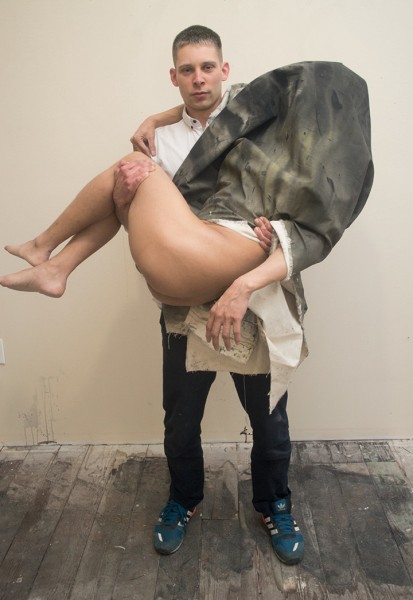ANDREJ DUBRAVSKY
DO YOU WANT TO LIVE LIKE ME?
Opening 02 Mai, 5 – 7 PM
Exhibition 02 May – 21 June, 2014
DITTRICH & SCHLECHTRIEM
Tucholskystraße 38, 10117 Berlin
The upcoming installation will include a number of large scale, stretched and unstretched, acrylic and oil paintings on canvas suggestive of wet, sentimental traditional landscapes and romantic out-of-doors figurative representations, pointedly self-aware and strikingly provocative in execution.
“Andrej Dúbravský comes from Bratislava, the capital of a small central European country, far from the centre of art things, even if Vienna – that once glorious capital of a great Empire – is very nearby. The more famous city’s dreams of cultural significance – which paradoxically even now likes to believe it invented the modern world, exposing sexual neurosis and tension as the driver and locus of the contemporary, as we understand it – culturally became marginalized one hundred years ago, now almost to the day, with the outbreak of the I World War. In that sense of delayed time and provincial place in the best sense, it is unsurprising that Andrej Dúbravský’s ambitiously conceived painting should be so suffused with hedonistic contemporary danger. […]
Andrej Dúbravský’s paintings indeed hark back to earlier expressive worlds, a century ago, of an artistic revolution inhabited by Egon Schiele and Oskar Kokoschka in Vienna, and Ernst Ludwig Kirchner and Otto Mueller in Dresden, the latter two part of the ground breaking group of artists based around 1910 in Dresden and known collectively as Die Bruecke or the Bridge. […] The best paintings, done in that now seemingly quite distant past, were invariably filled with naked bathers and other scenes of subjective sexuality and tension that reflect the transgressive obsessions of that age. Although there are human constants in the representation of sexuality, there is also that intangible thing known as the zeitgeist that reflects in both style and content the particular nuances that characterise a time, its freedoms and its repressions and a genius that lies in a place. Freedoms such as Andrej Dúbravský is able to enjoy and depict are reflections of these imperatives – he is both an expression and even a prisoner of his arguably dangerous and personal modes of thinking -, from which he has no intention of letting us – his viewers – escape, any more or less than did Vladimir Nabokov, writing in an other age, when describing Lolita and those who surrounded her. Political incorrectness is indeed sometimes required in order to arrive at genuine truths about the human psyche. […]“
The text excerpts above are from an essay by Curator and Art Historian Sir Norman Rosenthal on the work of Andrej Dúbravský published in the recent premier issue of TVTOR magazine.

